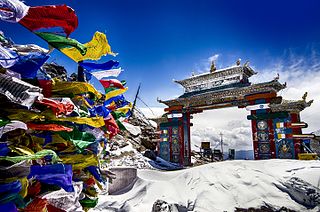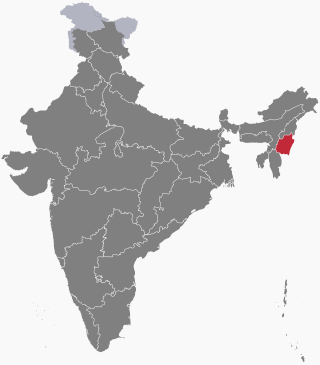
The United Liberation Front of Assam (ULFA) is an armed militant organisation operating in the Northeast Indian state of Assam. It seeks to establish an independent sovereign nation state of Assam for the indigenous Assamese people through an armed struggle in the Assam conflict. The Government of India banned the organisation in 1990 citing it as a terrorist organisation, while the United States Department of State lists it under "other groups of concern".

Northeast India, officially the North Eastern Region (NER), is the easternmost region of India representing both a geographic and political administrative division of the country. It comprises eight states—Arunachal Pradesh, Assam, Manipur, Meghalaya, Mizoram, Nagaland and Tripura, and the "brother" state of Sikkim.

The National Democratic Front of Boroland (NDFB) was an armed separatist outfit which sought to obtain a sovereign Boroland for the Bodo people. It is designated as a terrorist organisation by the Government of India.

The Insurgency in Northeast India involves multiple separatist militant groups operating in some of India's northeastern states, which are connected to the rest of India by the Siliguri Corridor, a strip of land as narrow as 14.29 miles (23.00 km) wide.

Terrorism in India, according to the Home Ministry, poses a significant threat to the people of India. Compared to other countries, India faces a wide range of terror groups. Terrorism found in India includes Islamic terrorism, ultranationalist terrorism, and left-wing terrorism India is one of the countries most impacted by terrorism.

The United National Liberation Front (UNLF), also known as the United National Liberation Front of Manipur, is a separatist insurgent group active in the state of Manipur in Northeast India which aims at establishing a sovereign and socialist Manipur.
The political structure of Assam in India is headed by the ceremonial post of the Governor. He is assisted by a council of ministers, headed by the Chief Minister, who are members of the Assam Assembly. In recent years the Governor has become more powerful, especially because the last two Governors have been ex-Army generals and the Army is entrusted with anti-insurgency operations against ULFA and other armed groups.

Insurgencies have been ongoing in Myanmar since 1948, the year the country, then known as Burma, gained independence from the United Kingdom. The conflict has largely been ethnic-based, with several ethnic armed groups fighting Myanmar's armed forces, the Tatmadaw, for self-determination. Despite numerous ceasefires and the creation of autonomous self-administered zones in 2008, many armed groups continue to call for independence, increased autonomy, or the federalisation of the country. The conflict is the world's longest ongoing civil war, having spanned more than seven decades.

The National Socialist Council of Nagaland (NSCN) is a Naga militant and separatist group operating mainly in northeastern part of India, with minor activities in northwest Myanmar (Burma). The main aim of the organisation is allegedly to establish a sovereign Naga state, "Nagalim", which would consist of all the areas inhabited by Naga tribes in Northeast India and northwest Myanmar. India claims that China and Pakistan provide financial support and weaponry to the NSCN. Drug trafficking and extortion are believed to be other major sources of income for the NSCN.

The All Tripura Tiger Force (ATTF) was a Tripuri nationalist militant group active in India's Tripura State. It was founded on 11 July 1990, by a group of former Tripura National Volunteer members under the leadership of Ranjit Debbarma. The ATTF is considered a terrorist organisation by India. According to the South Asian Terrorism Portal, approximately 90% of the ATTF's administration are Hindu and the rest are Christians. The group was said to have been formed as the armed wing of the National Liberation Front of Tripura (NLFT) but split into its own organization. The group was headquartered in Tarabon in Bangladesh.
Tripuri Nationalism is an ideology that supports self-determination by the Tripuri people. The conflict is in essence ethnic and the Tripuri community, indigenous to the region formed the clear majority of population in the princely state of Tippera, which joined the Republic of India in 1949 as the state of Tripura.

Assam separatist movements refers to a series of multiple insurgent and separatist movements that had been operated the in Northeast Indian state of Assam. The conflict started in the 1970s following tension between the native indigenous Assamese people and the Indian government over alleged neglect, political, social, cultural, economic issues and increased levels of illegal immigration from Bangladesh. The conflict has resulted in the deaths of 12,000 United Liberation Front of Assam (ULFA) militants and 18,000 others.
Secession in India typically refers to state secession, which is the withdrawal of one or more states from the Republic of India. Whereas, some have wanted a separate state, union territory or an autonomous administrative division within India. Many separatist movements exist with thousands of members, however, some have low local support and high voter participation in democratic elections. However, at the same time, demanding separate statehood within under the administration of Indian union from an existing state can lead to criminal charges under secession law in India. India is described as an ‘Union of States’ in Article 1 of the Indian constitution I.e "Indestructible nation of destructible states" by its father of constitution Dr. Bhimrao Ramji Ambedkar where a state or Union territory of India cannot secede from India by any means and the Central Government has more powers than the respective state governments and can forcefully change the names and boundaries of the states without their permission at any time when needed for self interest and for the maintenance of integrity.

Human rights abuse is an ongoing insurgency in Manipur, a northeastern Indian state. The issue started in the 1960s due to a separatist conflict. The Indian army, paramilitary, and police personnel are responsible for killings and torture within Manipur. Human rights violations by Indian security forces are said to have fueled the armed opposition groups in Manipur. Insurgent groups have kidnapped children to train them as child soldiers against the Indian government. Manipur was declared a “disturbed area” by the Indian government in 1980 in the Armed Forces Special Powers Act of 1958.

The 2014 Indian general election polls in Assam for 14 Lok Sabha seats was held in three phases on 7, 12 and 24 April 2014. The total voter strength of Assam is 18,723,032.

Operation All Clear was a military operation conducted by Royal Bhutan Army forces against Assam separatist insurgent groups in the southern regions of Bhutan between 15 December 2003 and 3 January 2004. It was the first operation ever conducted by the Royal Bhutan Army.

The Insurgency in Meghalaya is a frozen armed conflict between India and a number of separatist rebel groups which was taking place in the state of Meghalaya. The Insurgency in Meghalaya is part of the wider Insurgency in Northeast India, and was fueled by demands of the Khasi, Synteng and Garo people for a separate state.

The Insurgency in Manipur is an ongoing armed conflict between India and a number of separatist rebel groups, taking place in the state of Manipur. The Insurgency in Manipur is part of the wider Insurgency in Northeast India; it displays elements of a national liberation war as well as an ethnic conflict.
Operation Golden Bird was an Indian-Myanmar military operation conducted by the Indian Army in April–May 1995.

Shangwang Shangyung Khaplang was a Burmese leader of Naga ethnicity. He was the leader of the NSCN-K, an insurgent group that operates to establish a Greater Nagaland, a sovereign state bringing all Naga-inhabited areas of Myanmar and India under one administrative setup.















